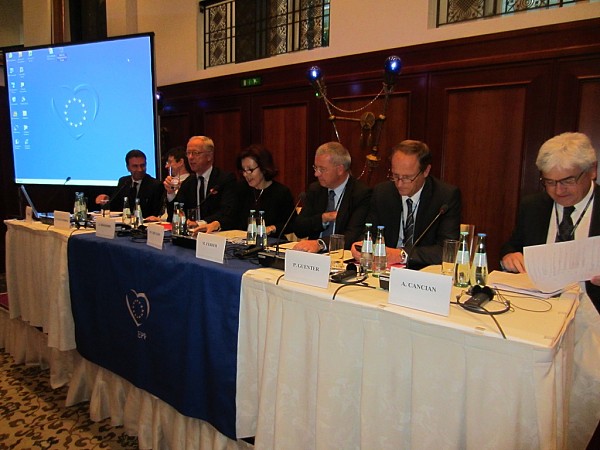Imprensa Channelling Finance and Innovation to Industry
Today, Maria da Graça Carvalho participated in the 11th annual Summer University of the EPP Group's think-tank, the European Ideas Network (EIN), held in Berlin.
The main discussion of the event focused on the future competitiveness of European industry and its role in promoting growth and stability in Europe. Many different opinions were expressed, but the main theme of fostering growth was common. It was significant that the meeting took place in Berlin, one day after the 22nd anniversary of the reunification of Germany. Solidarity and responsibility are crucial in helping to foster new economic growth, which was also one of the central themes of the meeting in Berlin.
Graça Carvalho chaired the roundtable Channelling Finance and Innovation to Industry, which focused in the industry sector in Europe and its aim to contribute to the EU's sustainability and competitiveness targets. Regulatory uncertainties and investment bottlenecks however make it difficult to unfold its full potential. The discussion looked at the current state of Europe's industrial sector and discussed how it could contribute to sustainable growth in Europe, the dificulties industry faces regarding financing, and what the EU could do to help support its industry. It covered the following topics:
- Sustainable growth in Europe is only possible with a competitive industrial base
- Current state of Europe's industrial sector in Europe
- Financing problems of R&I in Industry
- The role of investments in research, development and demonstration: How EU policies can contribute to a sustainable industrial base in Europe: The EU budget, Eurobonds, Risk sharing facility and Horizon 2020.
The Key note speech for this roundtable was given by Gunnar HÖKMARK MEP, Vice-President of the EPP Group in the European Parliament, Member of the EP Committee on 'Economic and Monetary Affairs. The panellists were Jorge NUNEZ FERRER, Associate Research Fellow, Centre for European Policy; Studies (CEPS); Massimo GARBINI, CEO and President, Italian Company for Air Navigation Services (ENAV); Peter GUENTER, President Global Europe, SANOFI and Antonio CANCIAN MEP, Member of the EPP Group in the European Parliament, Member of the EP Committee on 'Industry, Research and Energy'. The rapporteur was Markus FERBER MEP, Member of the EPP Group in the European Parliament, Co-Chairman of the German Delegation.
The EIN Summer University provided a forum for intense debate among stakeholders in European policy-making. A range of other major topics was also discussed - transatlantic relations, the European agenda after the US Elections, new ways of creating employment in a post crisis society and redefining true social dialogue to prevent populism and anarchy. There was also a debate on the aftermath of the Arab Spring, focusing on promoting democracy, the debate on Europe's energy market and the policy of Green Growth, and a discussion on the challenges of combining fiscal discipline and growth measures in the EU. Participants also debated the deepening of the Eastern partnership, free trade and capacity building, BRICs countries in the new world architecture and an agenda for the transatlantic digital market.
Speakers included Wolfgang Schäuble MP, the German Minister of Finance, Jaime Mayor Oreja MEP, Vice-Chairman of the EPP Group responsible for political strategy and the EIN, Herbert Reul MEP, Head of the German (CDU) Delegation of the EPP Group, Antonio Tajani, European Commissioner for Industry and Entrepreneurship, Günther Oettinger, European Commissioner for Energy, Algirdas Šemeta, European Commissioner for Taxation and Customs Union, Audit and Anti-Fraud, Asunção Esteves, President of the Portuguese Parliament, Members of the European Parliament, Heinrich Hiesinger, CEO of ThyssenKrupp, delegates from associations and high-level representatives from corporations and enterprises.

